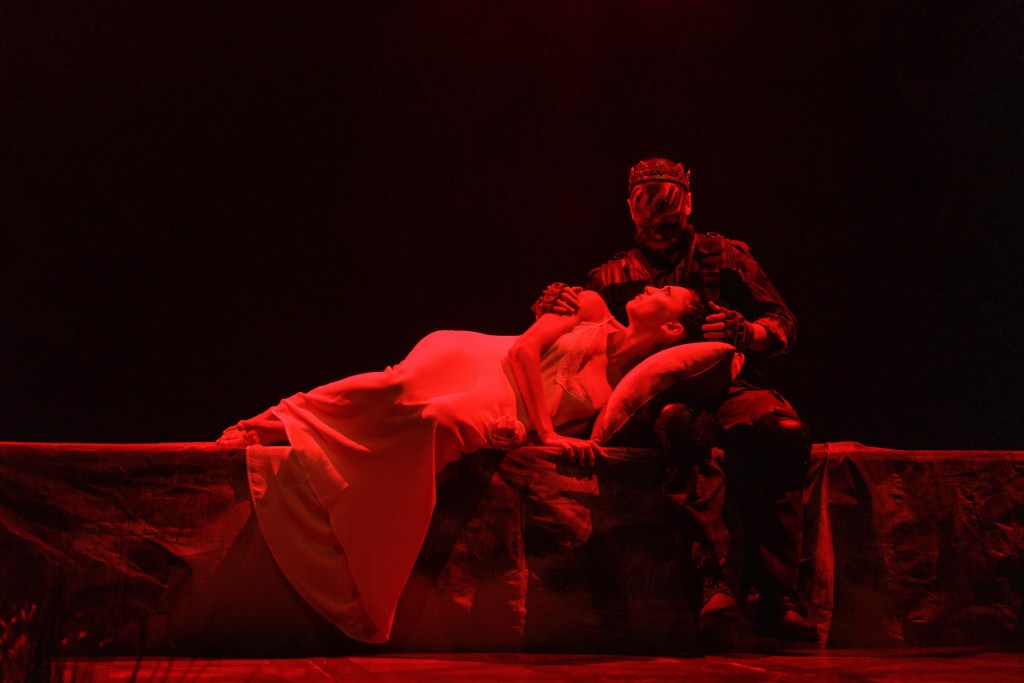
The superstition surrounding performing Shakespeare’s Macbeth is akin to the Curse of King Tut. Which is why some thespians prefer to refer to it as “the Scottish play”.
Director George Banders, who is in charge of a touring production coming to Caloundra, the Gold Coast and Toowoomba, admits there have been some spooky things happen around productions of The Tragedy of Macbeth – known mostly as just plain Macbeth. But he’s not worried.
“I personally don’t call it the Scottish play but some of the cast are a bit superstitious,” he says. “Some odd things have happened around productions and films of the play. And there is a myth that some witches cursed the play.”
The witches in question foretell the future for the usurper Macbeth, who wins the throne by murdering King Duncan. The witches have some pretty good lines and everyone knows “Double, double toil and trouble; Fire burn, and cauldron bubble”.
This play is spooky and bloody with witches, ghosts and murder most foul long ago in Scotland. (There was an 11th century Scottish king named Macbeth and Shakespeare mined history for his story).
Students love it and the Sydney-based theatre company Sport for Jove, which specialises in educational theatre, is bringing it across the border from NSW for Shakespeare lovers, students and first-time theatre-goers alike.
You might like
Directed by George Banders, this muscular and thought-provoking adaptation brings one of Shakespeare’s most iconic tragedies into the modern age, offering audience a fresh and relatable lens to experience this timeless classic that draws from both Scottish history and Greek myth.
Following the end of a brutal war, a celebrated military hero is thrust into a turmoil of political intrigue, supernatural prophecy and personal ambition. Urged on by his brilliant and driven wife, Macbeth embarks on descent into tyranny and madness in his quest for absolute power. As his world unravels, we are forced to confront what it means to sacrifice humanity for personal gain.

“Many of us first encounter this play in school, reading around the classroom, putting on our best witch voices, and trying to understand why the heck we still study this play 420 years after it was written,” Banders writes in the program for this production.
“The answer, as with most literature, comes down to human fallibility. Macbeth examines the cost of unchecked ambition, the strength of individuals in the face of tyrannical power and just how dangerous our imaginations can be.
“When approaching this play, I was excited to explore the journey from a Scotland full of life, colour, music, love, family and joy to a dead, dark, barren, paranoid kingdom where the lines between nightmare and reality are blurred. Can a damaged soldier’s mind find peace? Do we have any agency over our own lives? Can a marriage thrive when the lines of communication break down? This production brings us directly into the mind of Macbeth’s heat-oppressed, scorpion-filled brain, and ultimately leaves us with the most frequently asked question of life in 2025 … what is real?”
Subscribe for updates
this muscular and thought-provoking adaptation brings one of Shakespeare’s most iconic tragedies into the modern age
All fair enough questions and after each show there will be a Q&A session with the director and cast to dig deeper into this. Banders know the play inside out and has played both Macbeth (David Soncin in this production) and Banquo (who is also murdered and comes back to haunt Macbeth) in previous productions.
“They say Shakespeare once had to stand in and play Lady Macbeth,” he says. “Or so the story goes.”
And while it’s the witches and their prophecies that fascinate many of us, he points out that Shakespeare didn’t actually call them witches and they were originally referred to as the Wyrd Sisters (weird to us).
“They were like the fates,” Banders says. “Somewhere along the line they became witches.”
They remain witches to us, though, and in this production they come out from under a giant table draped with a Scottish flag that forms the centerpiece of this stage production.
And while the language remains Shakespeare’s, Banders has moved a couple of scenes around. Also, the Scots in this production are modern-day soldiers in fatigues and Macbeth is a military man suffering from PTSD, which may explain a lot.
But don’t worry, this is still Macbeth and all the best lines are intact. So, I guess all there is left to say is: “What’s done cannot be undone” and “Something wicked this way comes.”
Macbeth plays The Events Centre, Caloundra, on July 22 before the production heads to HOTA on the Gold Coast, July 25, and Empire Theatre, Toowoomba, August 7.
theeventscentre.com.au/event/macbeth-by-william-shakespeare
sportforjove.com.au/macbeth-2025
Free to share
This article may be shared online or in print under a Creative Commons licence

